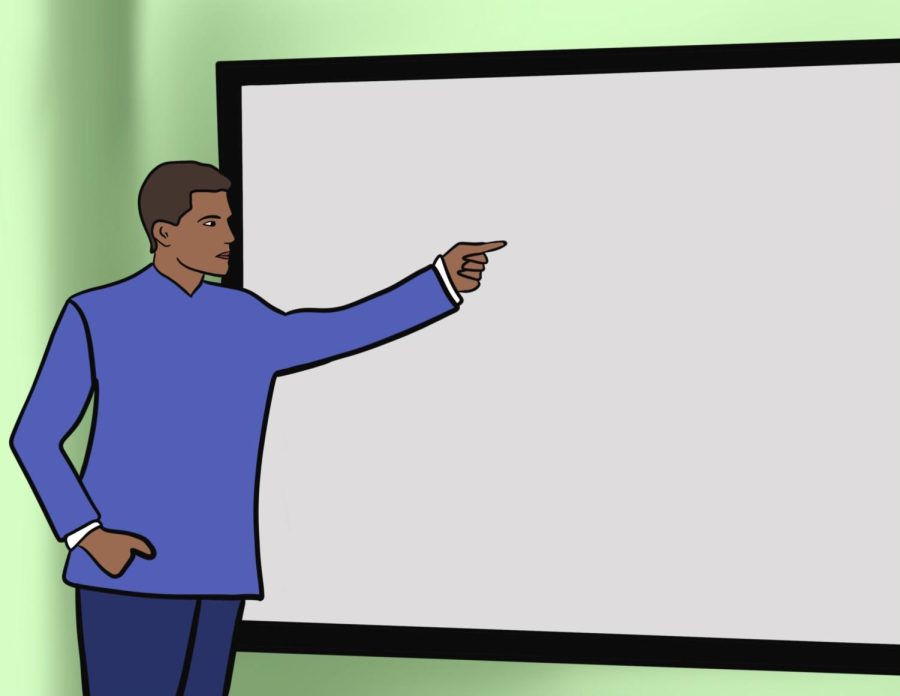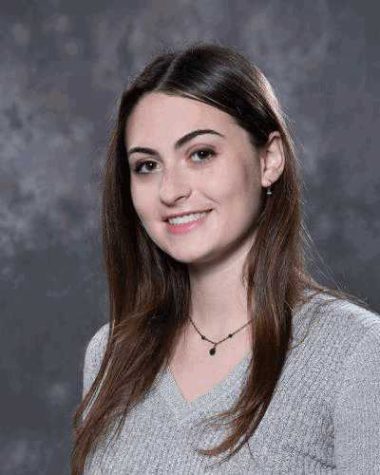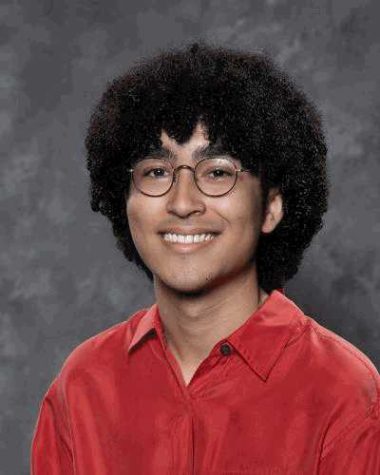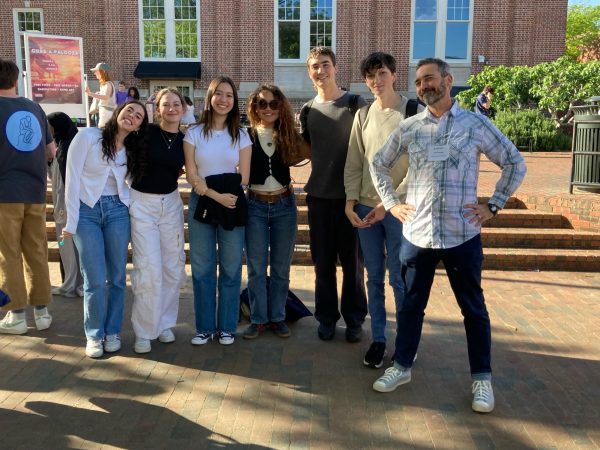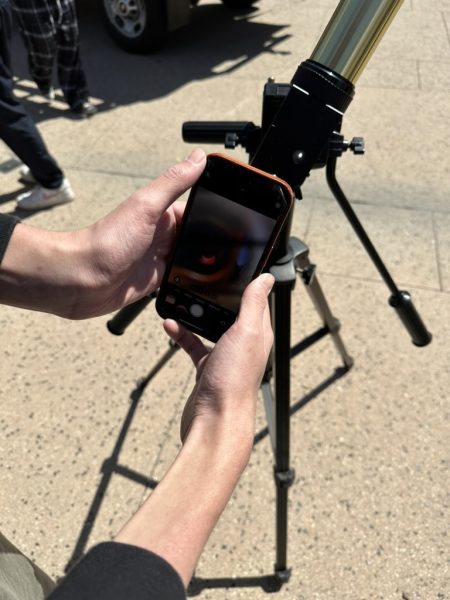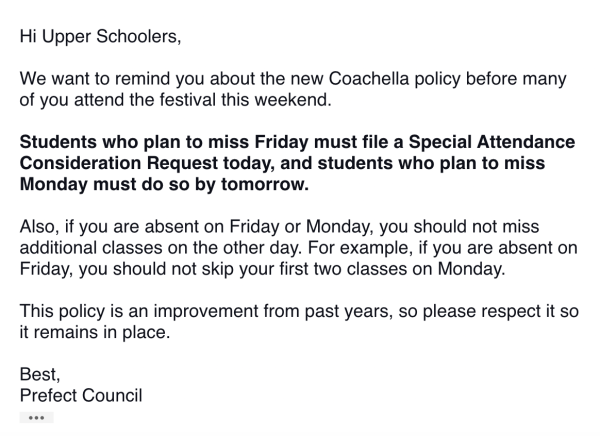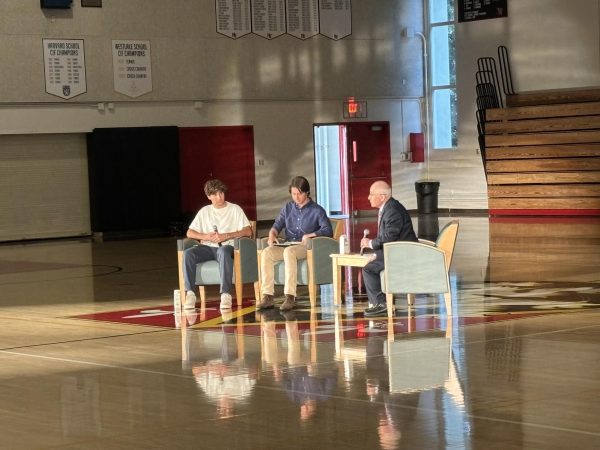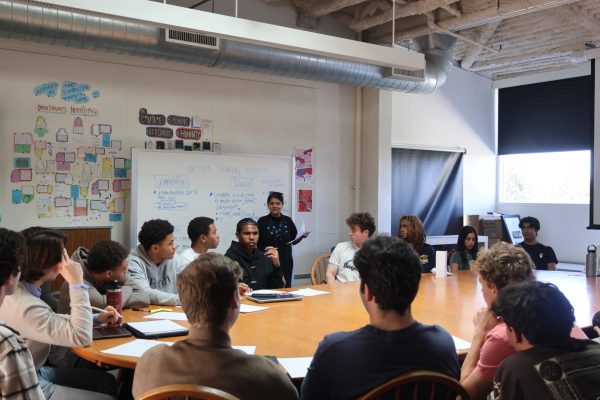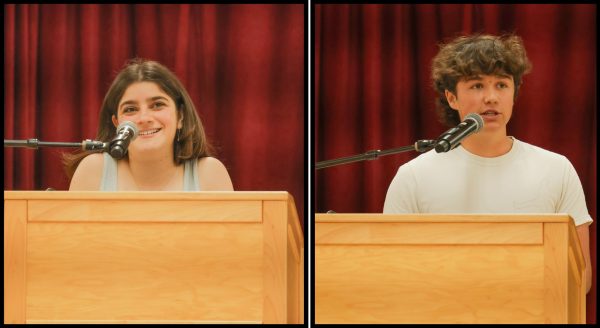SDLC students discuss leaked transcript
Illustration by Alexa Druyanoff
A student participates in an SDLC presentation to faculty, sharing incidents of racism at the school.
February 17, 2022
Students who attended the Student Diversity Leadership Conference (SDLC) gave their annual presentation to the faculty and administration Jan. 25. During the discussion, students responded to a post by Instagram account @wokeathw which featured a leaked transcript of the previous year’s meeting.
Dylan Perkins ’23, Fernanda Herrera ’23, Nicole Lee ’24, Nilufer Mistry Sheasby ’24, Zenmarah Duruisseau ’22 and Cionnie Pineda ’22 attended the conference, which unites diverse students from independent schools around the country to discuss how they can create change at their respective institutions. Following the conference, students gave a presentation to faculty members, focusing on the importance of identity in everyday life.
Duruisseau said the presentation was intended to both inform teachers and administrators of SDLC and introduce various opportunities for social justice efforts on campus.
“The purpose is for the faculty to understand what we do [at SDLC] because we were missing school for so long,” Duruisseau said. “Most of them have no idea what SDLC is, which is a problem. They need to know what it is. We give the presentation about how they can diversify the curriculum, or how they should diversify the faculty and the staff of the student body. Last year, we gave the idea to create a diversity board, which is basically Honor Board specifically for cases about racism and racial discrimination, sexual discrimination, etc.”
Duruisseau said she finds it empowering to use what she learned at the conference to help create change at the school.
“SDLC has impacted me by allowing me to really make change that I can see within my own community,” Duruisseau said. “For example, [the school] will be implementing the African-American studies course next year starting in fall 2022. [SDLC] allows me to have a leadership role within my own community, about issues that I’m particularly interested in and are important to me and my identity.”
Pineda said she values the conference because it provides a space to discuss topics that are not addressed as often at school.
“The whole point is to give [people of color] the opportunity to go and meet each other and make connections and to talk about the things that we want to talk about regarding diversity,” Pineda said. “Sometimes it’s hard to get those conversations going like in a predominately white space, but I really appreciate SDLC for the opportunity [the conference] gives kids who are really passionate about social justice or making the private school system more inclusive.”
English teacher Stephen Thompson said both faculty and students benefit from the SDLC presentations because faculty members are provided with a new perspective and students are given a forum to use their voices.
“I feel that it is really important for the faculty to hear the reports the students give from the conference, not only because it is generally edifying and informative, but I also think that it is empowering for the students themselves, students who often may not feel the most confident in their voices,” Thompson said. “I think it is really important for us to value those students and for those students to know that they are valued.”
Diversity, Equity and Inclusion (DEI) Director Janine Jones said that the presentation to the faculty also serves the purpose of bringing attention to the valuable experiences students have outside of school. These presentations are private, according to Duruisseau and Pineda, so that the students’ disclosures remain confidential and that the school can make decisions about social justice efforts without heightened public scrutiny. However, in July of 2021, transcripts of the presentation appeared on the Instagram account @wokeathw. The account, run by parents, alums, students and faculty, is dedicated to “documenting the self-destruction of an elite private school,” according to their Instagram bio. Although the post did not name the students whose quotes they leaked, calling them “Student 1” and “Student 2,” Duruisseau and Pineda said they were the students quoted by the account.
President Rick Commons, who met with Duruisseau on Friday, Feb. 4 to discuss the issue, said he does not know how the leak happened but is disappointed by the incident. He said the SDLC presentations were valuable for the staff and that the Instagram post was not made in good faith.
“I’m unclear on how the @wokeathw account became aware a year ago of the presentation by SDLC,” Commons said. “There was a post that was critical of that presentation. That was hurtful to the people who made the presentation, and I was sorry to see it because I felt that that group has been very good at kindly helping us to understand how to do better, and I didn’t like seeing a criticism on [the account]. I thought it was not in keeping with the spirit of the presentation or the spirit of our community.”
Perkins, who also participated in this year’s SDLC conference, said that the public posting of the transcript defeated the purpose of the presentation.
“Our meetings with faculty are supposed to be confidential, and our experiences are supposed to be listened to, not used in a stupid fight between privileged parents and teachers and the school,” Perkins said.
In this year’s SDLC presentation, Duruisseau addressed the publishing of her and Pineda’s quotes on @wokeathw. She said she specifically spoke about how the administration did not alert her of the leak or apologize for the incident at the time it occurred and how this affected her.
“No one from [the school] notified me and [Pineda] that we were mentioned in a post that has the school’s name on it,” Duruisseau said. “No one apologized to us. It’s very frustrating that [the school] never took an initiative to look out for their own kids. My biggest issue is that a grown adult recorded children, which is illegal in the state, and sent it to an account that is run by faculty, staff and students who are against everything that I stand for. It’s disgusting and it angers me so much. I haven’t really had time to process how I feel about it.”
Pineda said she found Duruisseau’s statements to be extremely powerful and necessary, as she also did not see any administrative follow-up to the incident.
“[Duruisseau] voiced that she was completely baffled at the response, or lack of response, that we got over this,” Pineda said. “The fact that there were teachers that were present in the meeting this year that wrote word for word what we said last year, and I have no idea if they posted it themselves, they gave it to the account [or] they gave it to someone running the account. It was kind of scary because I’d never realized that there are teachers that, secretly, in their own time away from school, have the opportunity to say such disrespectful things on social media. I’m very proud of [Duruisseau] for that because it takes a lot of courage to call people out.”
Jones said that she was concerned about the effects of this leak on the trust between students and faculty.
“I have heard from [students who] have expressed strong disappointment that an adult in our community felt compelled to share what students courageously shared with faculty and staff,” Jones said. “They likely have every ‘right’ to do so, but it really hurt our students who shared. Ultimately, not only do I never want to be the cause of harm to our students, I wholeheartedly want to support and encourage their vulnerability, and the sharing of this information with that Instagram account damaged that trust and deeply hurt not only the students who shared but also their colleagues and the greater community.”
Despite this incident, math teacher Joshua Helston said his impression of the general attitude of faculty towards DEI initiatives is positive, and he appreciated the opportunity to learn and grow.
“I believe the vast majority of the faculty have a generally positive outlook on DEI initiatives, which would indicate a welcoming or positive climate,” Helston said. “Especially among the colleagues I often interact with, we are open-minded individuals who passionately care about teaching and learning. As one grows to better understand learning, one realizes it is a life-long process and it is rare to ever finally arrive at a final answer.”



































